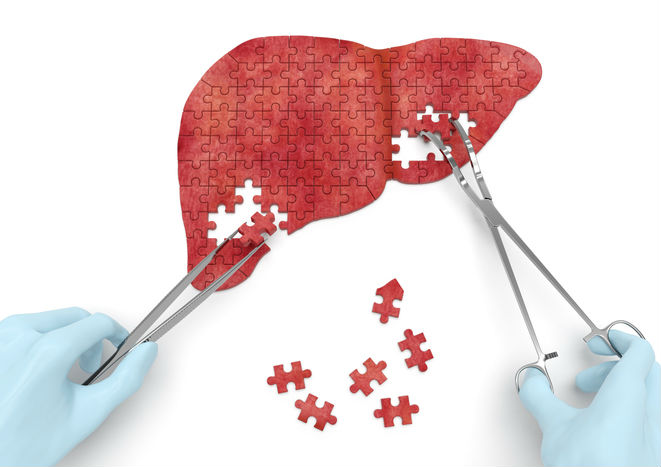
A Taiho Oncology drug for bile duct cancer is now approved by the FDA, providing a new treatment option for patients with advanced disease. The regulatory decision makes the Taiho drug the third product approved for such cancers driven by a particular genetic signature, but the drugmaker contends its cancer therapy has an edge over those rival products.
Approval of the Taiho drug, futibatinib, covers adults with intrahepatic cholangiocarcinoma, a rare cancer affecting the bile ducts of the liver. Many genetic variants can drive the progression of this cancer. The approval announced late Friday covers one of them: gene fusions or other rearrangements to fibroblast growth factor receptor 2 (FGFR2), a protein that’s involved in cell division and maturation. Futibatinib is a small molecule designed to block that protein. Taiho will market its new drug under the name “Lytgobi.”
Bile duct cancer is rare, leading to an estimated 8,000 diagnosed cases in the U.S. annually, according to the American Cancer Society. That figure encompasses both intrahepatic cancer, which is found inside of the liver, as well as extrahepatic cancer diagnosed outside of the organ. About 20% of patients diagnosed with bile duct cancer have the intrahepatic form of the disease. When this cancer advances or spreads following first-line treatments, patients have few available drug options.
The FDA decision for Lytgobi was based on the results of an open-label, single-arm Phase 2 clinical trial enrolling 103 patients. Those patients had advanced bile duct cancer characterized by an FGFR2 genetic signature confirmed by genetic sequencing. The main goals of the study were measuring overall response and duration of response. Results showed that treatment with the once-daily pill led to an overall response rate of 42%. The median duration of response was 9.7 months. The most common adverse reactions observed in the study included nail toxicity, muscle pain, constipation, and diarrhea.
The Taiho drug was studied in patients whose cancers progressed after receiving standard treatment, which included other FGFR2 inhibitors. The two other FGFR2-blocking drugs that have already reached the market for bile duct cancer are from Incyte and QED Therapeutics. Incyte’s Pemazyre was first, winning its accelerated approval in 2020. That drug accounted for $68.5 million in sales in 2021, according to Incyte’s financial reports.

A Deep-dive Into Specialty Pharma
A specialty drug is a class of prescription medications used to treat complex, chronic or rare medical conditions. Although this classification was originally intended to define the treatment of rare, also termed “orphan” diseases, affecting fewer than 200,000 people in the US, more recently, specialty drugs have emerged as the cornerstone of treatment for chronic and complex diseases such as cancer, autoimmune conditions, diabetes, hepatitis C, and HIV/AIDS.
Last year, the FDA approved Truseltiq from QED, a subsidiary of BridgeBio Pharma. In March, BridgeBio announced it had amended its partnership with Switzerland-based Helsinn Group, granting that company an exclusive license to commercialize Truseltiq in the U.S. and to develop the drug globally, excluding China, Hong Kong, and Macau. Under the initial partnership struck in 2021, the partners agreed to share in U.S. commercialization along with co-development of the molecule globally.
Taiho notes that the Incyte and QED drugs are what’s called reversible ATP-competitive inhibitors. Such drugs don’t form a covalent bond with their targets. By contrast, Taiho says its drug forms a covalent bond with FGFR2. This stronger bond can improve the selectivity of a drug, as well as its potency and duration of effect.
With the caveat that Lytgobi’s clinical trial did not compare it head to head against the Incyte and QED drugs, the Taiho drug’s results show higher measures of overall survival and duration of response. In the clinical trial results supporting the approval of Incyte’s drug, the overall response rate was 36%; the mediation duration of response was 9.1 months. For QED’s drug, the overall response was 23% and the median duration of response was 5 months.
The regulatory decision for Lytgobi is an accelerated approval, which means that Taiho will need to generate more clinical data to confirm the drug’s safety and efficacy. Princeton, New Jersey-based Taiho Oncology is part of Taiho Pharmaceutical, which discovered the small molecule and is continuing to develop the drug for potential applications in other tumor types. Mid-stage clinical trials underway for the drug includes tests in breast cancer, gastric cancer, myelolymphoid neoplasms, as well as bladder and lung cancers. Taiho Pharmaceutical is itself a subsidiary of Tokyo-based Otsuka Holdings, a holding company whose businesses include Otsuka Pharmaceutical.
Photo: Sakramir, Getty Images












